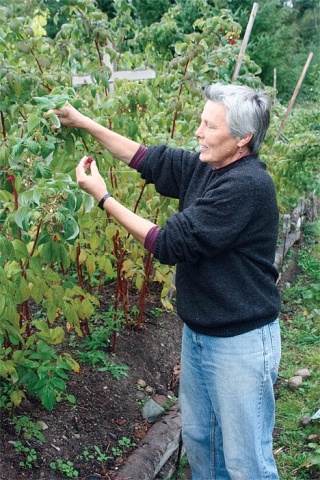Steps are being taken to ensure farming remains a vital part of Whidbey Island’s culture.
The Greenbank Farm, which at one time was the largest loganberry farm in the country, will become a training ground for folks eager to enter farming.
More than eight acres will be set aside to become a community supported agriculture training center. That land will be used to teach budding farmers the finer points of small-scale, organic farming and how to sell their products to nearby residents. The program will also provide an affordable place for residents to obtain healthy, organic food.
“We want to have local food accessible to local people no matter their income level,” said Maryon Attwood, program manager for the Northwest Agriculture Business Center, which is helping start the community supported agriculture training program.
The new program will help fill a demand islanders have for locally-grown produce by helping more people grow food. There are about six community supported agriculture, or CSA, programs scattered throughout Whidbey Island.
Rosehip Farm and Garden, located in Ebey’s Landing National Historical Reserve, has a waiting list of people who wish to buy produce, said co-owner Linda Barlett. Rosehip has participated in CSA for the past four seasons.
Attwood said the Greenbank Farm training program is a great concept as demand for locally-produced food is high and continues to grow.
Between now and Dec. 10, people interested in learning and starting their own CSA operation can apply to the program offered by the Greenbank Farm.
Enrollees will farm a half-acre of land and provide food to people and organizations who purchase a $500 share. That share provides one bag of food for 20 weeks from May through September.
The training program does require a significant time commitment. People selected can expect to spend around 30 hours a week tending to the plot of land, Attwood said.
A former manager of the Tilth Farmers Market has been selected to coordinate the training of new farmers.
Anza Muenchow has been operating a community supported agriculture farm on South Whidbey Island for the past several years. She said she became interested in CSA when she was a social worker building community gardens in urban neighborhoods.
“As a social worker, I was always very aware of access to high quality food,” Muenchow said. She currently farms an acre-and-a-half and 13 people have purchased shares in her operation. She said the size of her farm is perfect for her and her husband to operate.
She said community supported agriculture provides a connection between consumers and the people who grow food. Generally, when food arrives in supermarkets, it has traveled approximately 1,500 miles.
Her operation gives her customers a chance to see how their food is grown and to meet the farmer involved.
“People know that I grew it and it’s here,” Muenchow said.
She is also committed to teaching others about farming. Since Muenchow started her farm, she has had one or two interns work on her farm each year, so becoming the coordinator of the CSA program at the Greenbank Farm was a natural next step.
Finding land in Greenbank
One of the biggest hurdles organizers had to get the training program off the ground was finding suitable land.
Attwood said the Greenbank Farm land was a good spot because it is publicly owned and it is located in the center of the island, which makes it easy to access for everyone.
“Having an adequate land base is the biggest hurdle to having this program,” Attwood said.
The land chosen for the training center, which will be called Community Supported Agriculture Training Center at Greenbank Farm, was formerly a seed farm operated by Alf Christensen Seed Company. The Mount Vernon seed company vacated the eight-acre plot last April and farm officials have been looking for a suitable replacement to work the organic-certified land.
Tom Baenen, president of the Greenbank Farm Management Group, said expanding agriculture at the publicly-owned farm has been a goal for a very long time.
Attwood said the idea for the training center grew from work performed by an agriculture committee assisting with the master site plan for the Greenbank Farm.
“We were interested in a community collaboration that was about farmers and food,” Attwood said.
Even though the training center is getting off the ground before the master site plan is finished, Baenen said it is a good fit and the land is available and needs to be used.
“We’re very excited,” said Jim Patton, executive director of the Port of Coupeville, which owns the commercial area of the farm. “It underscores the identity of the farm as a farm.”
He said there weren’t any other offers to use the land vacated by the seed company, and officials wanted a tenant before weeds started growing.
“We didn’t get anybody interested in plowing that,” Patton said.
He said some adjustments will have to be made to the irrigation system to meet growers’ needs and that work should be done by spring. A cover crop is also going in to protect the land until the training of new farmers begins.
The Northwest Agriculture Business Center received a grant from the USDA Specialty Crop Block Grant Program worth $40,700. The Greenbank Farm land, plus an office space at the farm, provided in-kind donations that allowed the grant to go through. The people participating in the training program will earn money through the shares that are purchased.
Attwood said more than people will be able to buy shares, in addition local churches and food banks on South and Central Whidbey Island will also participate in community supported agriculture. That way low-income families will have access to high-quality, organic produce.
Folks interested in participating in the community supported agriculture program at the Greenbank Farm should call Coordinator Anza Muenchow at 579-2982 or the Northwest Agriculture Business Center at 336-3727. Information can be found on the Internet at www.agbizcenter.org.



